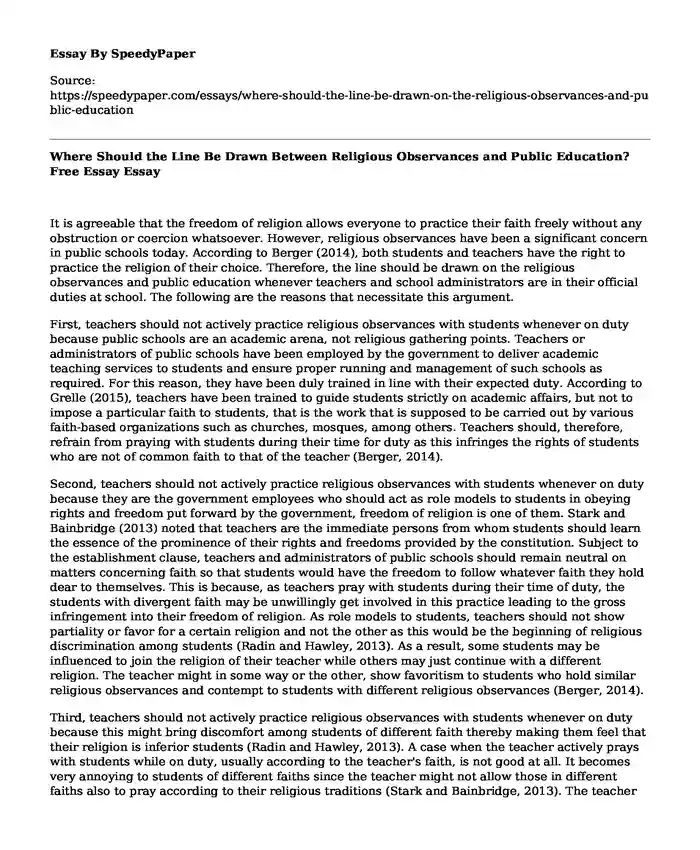
| Type of paper: | Course work |
| Categories: | Students Religion Conflict resolution Social issue |
| Pages: | 3 |
| Wordcount: | 750 words |
It is agreeable that the freedom of religion allows everyone to practice their faith freely without any obstruction or coercion whatsoever. However, religious observances have been a significant concern in public schools today. According to Berger (2014), both students and teachers have the right to practice the religion of their choice. Therefore, the line should be drawn on the religious observances and public education whenever teachers and school administrators are in their official duties at school. The following are the reasons that necessitate this argument.
First, teachers should not actively practice religious observances with students whenever on duty because public schools are an academic arena, not religious gathering points. Teachers or administrators of public schools have been employed by the government to deliver academic teaching services to students and ensure proper running and management of such schools as required. For this reason, they have been duly trained in line with their expected duty. According to Grelle (2015), teachers have been trained to guide students strictly on academic affairs, but not to impose a particular faith to students, that is the work that is supposed to be carried out by various faith-based organizations such as churches, mosques, among others. Teachers should, therefore, refrain from praying with students during their time for duty as this infringes the rights of students who are not of common faith to that of the teacher (Berger, 2014).
Second, teachers should not actively practice religious observances with students whenever on duty because they are the government employees who should act as role models to students in obeying rights and freedom put forward by the government, freedom of religion is one of them. Stark and Bainbridge (2013) noted that teachers are the immediate persons from whom students should learn the essence of the prominence of their rights and freedoms provided by the constitution. Subject to the establishment clause, teachers and administrators of public schools should remain neutral on matters concerning faith so that students would have the freedom to follow whatever faith they hold dear to themselves. This is because, as teachers pray with students during their time of duty, the students with divergent faith may be unwillingly get involved in this practice leading to the gross infringement into their freedom of religion. As role models to students, teachers should not show partiality or favor for a certain religion and not the other as this would be the beginning of religious discrimination among students (Radin and Hawley, 2013). As a result, some students may be influenced to join the religion of their teacher while others may just continue with a different religion. The teacher might in some way or the other, show favoritism to students who hold similar religious observances and contempt to students with different religious observances (Berger, 2014).
Third, teachers should not actively practice religious observances with students whenever on duty because this might bring discomfort among students of different faith thereby making them feel that their religion is inferior students (Radin and Hawley, 2013). A case when the teacher actively prays with students while on duty, usually according to the teacher's faith, is not good at all. It becomes very annoying to students of different faiths since the teacher might not allow those in different faiths also to pray according to their religious traditions (Stark and Bainbridge, 2013). The teacher would always make prayers according to their faith and favor only the students in the same faith as they are. While doing all these, students belonging to different faith feel left out and not considered as their fellow students sharing the same faith as the teacher. This might bring differences among students themselves on religious lines, thereby, creating discrimination, jealousy, and religious conflict among students. Therefore, religious observances should be discouraged strictly in public education.
In conclusion, it is evident that religious observances in public schools might cause several unintended adverse effects on students such as discrimination, jealousy, and religious conflicts. Therefore, a line should be drawn between religious observances and public education such that teachers should not actively practice religious observances with students whenever on duty.
References
Berger, B. L. (2014). Religious diversity, education, and the "crisis" in state neutrality. Canadian Journal of Law & Society/La Revue Canadienne Droit et Societe, 29(1), 103-122.
Grelle, B. (2015). Neutrality in public school religion education: Theory and politics. Issues in Religion and Education. Whose Religion, 231-256.
Radin, B. A., & Hawley, W. D. (2013). The politics of federal reorganization: Creating the US Department of Education. Elsevier.Stark, R., & Bainbridge, W. S. (2013). Religion, deviance, and social control. Routledge.
Cite this page
Where Should the Line Be Drawn Between Religious Observances and Public Education? Free Essay. (2022, Dec 30). Retrieved from https://speedypaper.net/essays/where-should-the-line-be-drawn-on-the-religious-observances-and-public-education
Request Removal
If you are the original author of this essay and no longer wish to have it published on the SpeedyPaper website, please click below to request its removal:
- Essay Example on Schizophrenia Research
- The Baptist Faith, Essay Example in Religion
- Essay Sample on The Northerners Versus The Southerners
- Essay Sample: Calls for Government Engagement in Food Industry Sector
- The Impacts of Artificial Intelligence - Essay Sample
- Free Essay on Swot Analysis of Hilton Los Angeles Airport Hotel
- Essay Sample on Road Rage
Popular categories




